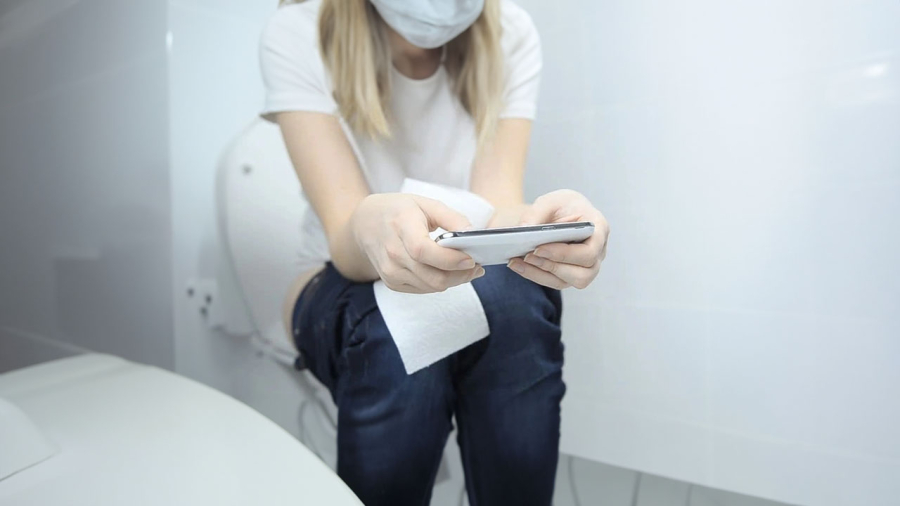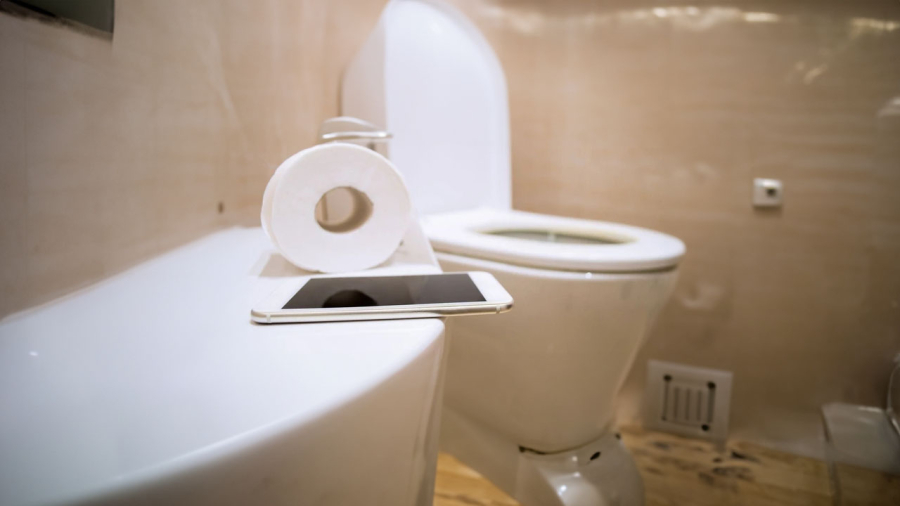Many people bring their phones with them when they sit on the toilet to use the bathroom, and even enthusiastically use their phones for entertainment purposes for a long time in the restroom. Mobile devices are very convenient, so many people like to bring them along. In the past, when technology was not as advanced, many people used to bring books and newspapers to read while sitting. Now they believe that phones are more convenient devices to bring along. A survey conducted by NordVPN showed that 65% of respondents (out of 9,800 adults participating in the survey) admitted that they use their phones when using the bathroom or in the shower.
According to Dr. Roshini Raj, a gastroenterologist at NYU Langone Medical Center and the author of the book “The Gut Makeover,” she affirms that this habit is very harmful, so phones should not be brought along, especially not to spend more than 10 minutes in the bathroom. However, she also admits that there are no specific standards in this matter, but spending too much time in the bathroom can lead to potential health problems.

Risks of bringing phones to the bathroom
Bringing phones to the bathroom makes you sit in the restroom for longer, leading to many consequences:
Sitting for long periods increases the risk of hemorrhoids: Sitting for a long time can lead to hemorrhoids, with swollen veins causing pain in the anal area. One contributing factor to this is the design of the toilet. “We know that all toilets are empty in the middle. This will make the rectal and intestinal area dip lower than the part supported by the thigh muscles,” increasing the risk of developing hemorrhoids when sitting for a long time. When the anus is not supported, it becomes suspended and exerts pressure on the veins, leading to hemorrhoid prolapse. Moreover, peristalsis is the name for the rhythmic muscle contractions that help move stool through the intestines to the rectum. Sitting in the bathroom for a long time without doing anything that can impede this process.
Sitting for longer attracts more bacteria: The environment in the bathroom or shower room is damp and filled with bacteria. Therefore, when bringing your phone and sitting for a long time, you are exposed to even more bacteria. Placing your phone on the sink shelf or holding it for a long time allows bacteria to attack the phone, and then it will be transferred to you during use. Sitting in the bathroom for a long time allows bacteria to enter your eyes, nose, hair, respiratory system… Then, many diseases can be transmitted when you sit in the bathroom for a long time while bringing your phone along:

Infection risk
Mobile phones are even dirtier than toilet seats. Mobile phones are said to have E.coli, a type of bacteria that causes severe food poisoning, and many more types of bacteria.
Increased risk of hemorrhoids
Using the phone while using the bathroom prolongs the time you sit on the toilet. At this time, the organs in the body will be under a lot of pressure. This is the main cause of an increased risk of hemorrhoids. Hemorrhoids not only make you uncomfortable in daily life, but also increase the risk of infection when surgery is performed incorrectly, which can be dangerous.
Limiting memory function
Mobile phones can cause disrupted thinking and concentration. Furthermore, using the phone while using the bathroom also limits your ability to solve decisive problems in your life.
Disrupting pelvic floor function
Spending a lot of time sitting on the toilet is not ideal for the function of supporting the pelvic floor. Sitting for too long in a certain position weakens the pelvic bone and makes it less capable of supporting the organs above it.
All of the above will have extremely dangerous consequences. But they do not cause immediate illnesses, so many people still do not realize the danger and remain complacent. Prevention is better than cure.





























